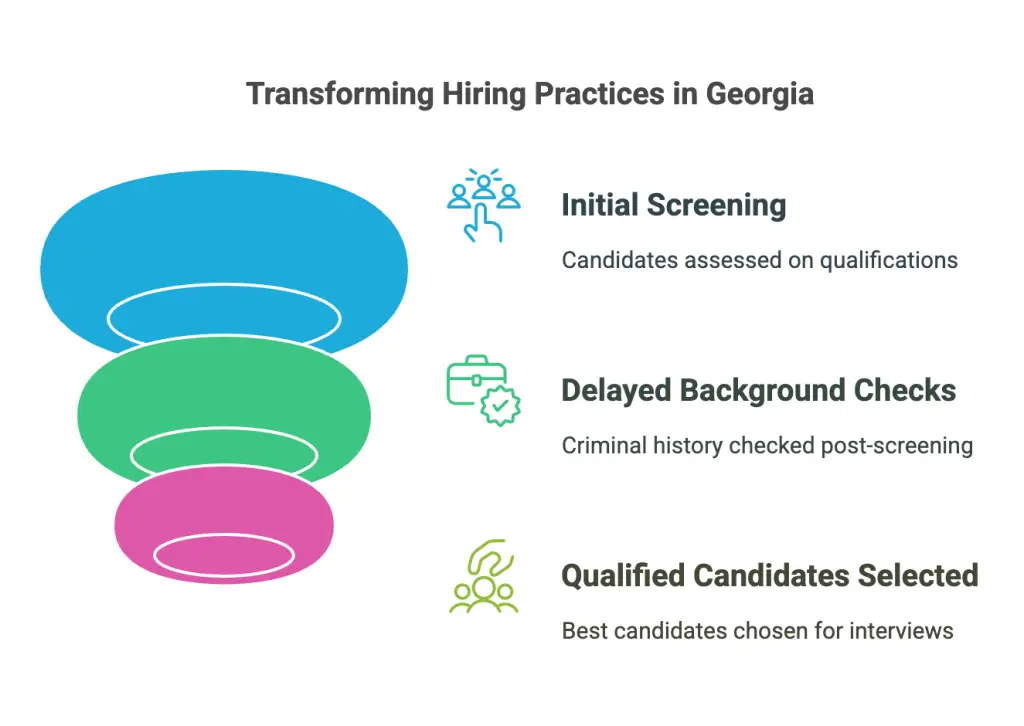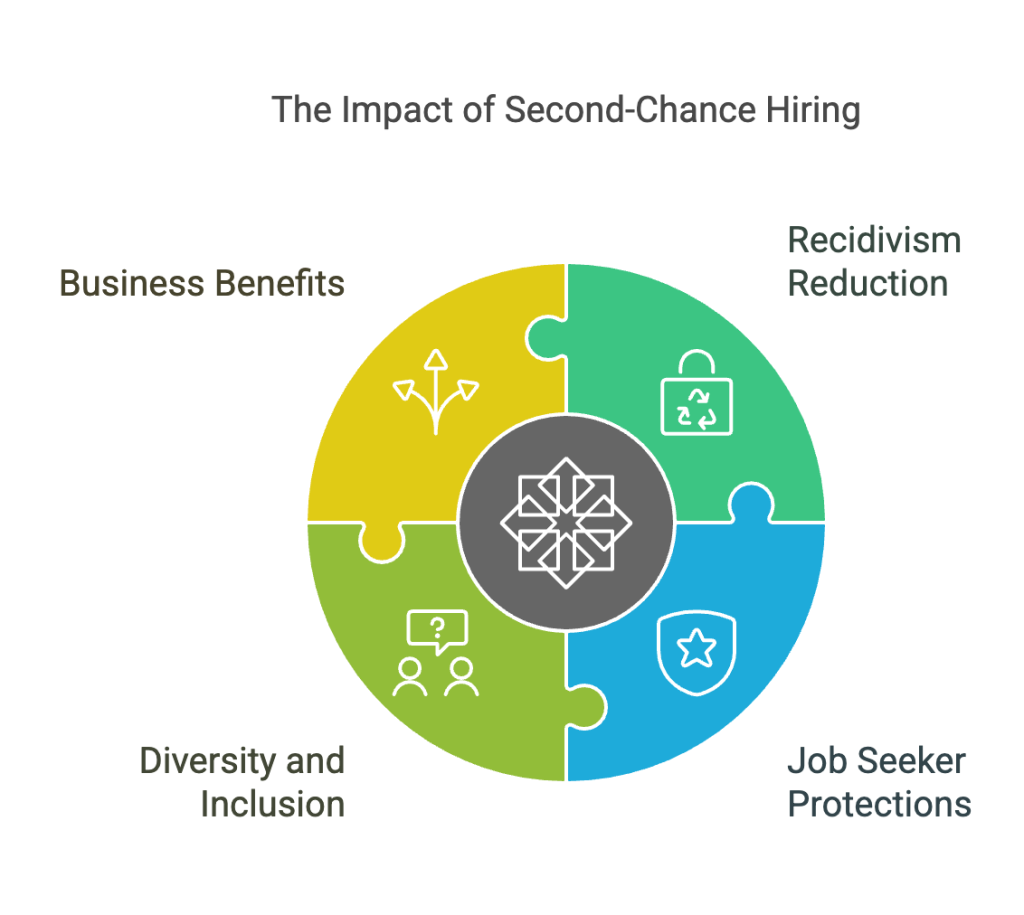In recent years, the "Ban the Box" movement has gained significant traction across the United States, advocating for fair hiring practices that promote second chances for individuals with criminal records. Georgia is no exception, with ongoing developments aimed at fostering more inclusive employment opportunities. This guide provides an in-depth 2025 update on "Ban the Box" in Georgia, covering the latest legal, social, and technological dimensions. Whether you're an employer seeking compliance tips or a job seeker navigating the application process, this article offers data-driven insights and actionable takeaways.
Key Takeaways
- "Ban the Box" in Georgia aims to prevent discrimination by removing criminal history questions from initial job applications, creating fairer hiring practices.
- Employers are required to comply with these regulations, ensuring that background checks occur later in the hiring process without compromising legality.
- This policy reduces recidivism by facilitating job opportunities for individuals with criminal records, enhancing community integration and economic diversity.
- Advanced digital tools like Checkr and GoodHire help automate compliance, making background checks faster and more accurate while respecting data privacy laws.
- Despite the benefits, challenges remain as some employers express concerns about safety and trust once background information is withheld until later stages.
Introduction
Keeping up-to-date with "Ban the Box" legislation in Georgia is important for both employers and job seekers. The changes affect the way companies hire and provide opportunities for candidates with criminal records.
Our focus is to update you on current legal requirements, social implications, and technological advances that influence hiring. Weâll explore how this movement impacts both sides of the employment coin.
Georgiaâs push for fair hiring is not just about compliance. Itâs about recognizing potential and supporting community reintegration. These policies boost the local economy and create a more inclusive workforce.
With these updates, you align with ethical hiring practices and contribute to societal growth. Expect to meet legal responsibilities and leverage new technologies for effective background checks. Embrace these changes as an opportunity, not a challenge. Your proactive steps can foster a positive work environment and open doors for deserving candidates.
Stay informed and take charge of "Ban the Box" regulations. This update equips you with essential knowledge to adapt effectively.
Understanding "Ban the Box" in Georgia

"Ban the Box" refers to a movement aimed at removing the check box that asks if applicants have a criminal record from job application forms. It originated from the efforts of advocacy groups in the early 2000s, looking to offer fair employment opportunities to individuals with criminal histories.
The goal is simple: allow candidates to be judged based on their qualifications first. This offers them a better chance at securing interviews and potentially jobs without being preemptively disqualified due to their past.
Georgia has been active in this effort. As of 2025, the state has implemented significant legislative updates. Employers are now required to delay inquiries into a candidate's criminal history until after the initial stages of the hiring process. This shift aims to minimize bias and promote equal opportunities.
The latest laws mandate that only positions that legally require background checks can initially ask about an applicant's criminal past. This change impacts both public and private employers, who must ensure their hiring processes align with these regulations.
Looking back, previous laws allowed employers more discretion when including background questions early in the application process. The new legislation limits this practice, forcing a more thoughtful consideration of an applicant's qualifications first.
For employers, this means revising hiring practices to comply with state mandates. For job seekers, it opens doors that might have otherwise remained closed due to premature judgments. Would you have approached hiring differently if you'd known the candidate's abilities before their past?
These changes aim to foster a fairer job market in Georgia. Living up to these new standards could reshape how businesses approach talent acquisition, focusing more on skills than past mistakes.
Legal Aspects and Compliance
If you're an employer in Georgia, understanding "Ban the Box" compliance is crucial. This law alters how you approach hiring, particularly when it comes to applicants with criminal records.
At its core, the legislation prevents you from asking about criminal histories on initial job applications. This doesn't mean you can't check backgroundsâjust that it can't be a part of the first impression.
You still need to ensure that once it's legally appropriate, your background checks align with state guidelines. Implement a structured process that defines when and how these checks occur.
To stay compliant, review your job applications and interview protocols. Remove that checkbox about criminal history where it's not permissible. Instead, focus on assessing skills and qualifications first.
Documentation is also important. Keep detailed records of hiring procedures to prove compliance if questioned. This includes when a background check was conducted and its influence on hiring decisions.
For extra peace of mind, consider consulting with legal counsel well-versed in employment law. The Professional Background Screening Association (PBSA) offers resources you might find helpful.
By following these steps, you protect your business while also contributing to fair hiring practices.
Social Implications and Benefits

Second-chance hiring laws play a pivotal role in reducing recidivism. By providing job opportunities to individuals with criminal records, these laws help integrate them back into society, decreasing the likelihood of re-offending. Research supports thisâemployment significantly lowers recidivism rates. When people find stable jobs, they're less likely to return to crime. Consider this: would you choose a life of crime if you had steady work that paid your bills?
Job seeker protections guard against discrimination. The "Ban the Box" movement emphasizes fairness by delaying the inquiry into an applicant's criminal history. This lets candidates present their skills first. Imagine applying for a job without worrying about automatic disqualification due to past mistakes. For many, this is a lifeline.
The impact on diversity and inclusion can't be ignored. "Ban the Box" opens doors to a broader talent pool, fostering a workforce that mirrors real-world diversity. Georgia's businesses can benefit from varied perspectives. Are your hiring practices welcoming such diverse voices?
These social benefits align with modern values, making companies more attractive to customers and potential hires alike. Diversity isn't just a checkbox; it's a business advantage. Will your company leverage this positive shift in fair hiring practices?
Technological Advancements
Background checks have changed significantly with new technology. These advancements streamline processes and improve accuracy. Employers benefit from faster and more reliable information.
Digital tools now manage and simplify compliance with "Ban the Box". Platforms like Checkr and GoodHire provide efficient solutions. They automate complex compliance tasks, ensuring you follow the law without hassle.
Data privacy is a major concern when dealing with digital background checks. You must handle sensitive information carefully. Compliance with GDPR and other privacy laws is non-negotiable. Missteps can lead to legal issues and erode trust. Be diligent about data protection to maintain both legal and ethical standards.
Technology reshapes hiring. Embrace it thoughtfully to benefit from fairer processes without compromising security. Are your systems up to date with today's privacy demands?
Challenges and Criticisms
"Ban the Box" aims to create fairer opportunities, but not everyone is on board. Employers often voice concerns about these hiring policies. They worry about the potential risks of hiring someone with a criminal record without first knowing the extent of their past. Safety and trust within the workplace are paramount, and anything that seems to compromise that stability can be unsettling.
Consider the hiring pressures in industries like healthcare or childcare. Employers in these fields might be more cautious due to the nature of their work. They often argue that having full background information upfront helps in making sound hiring decisions.
There's also debate about how effective "Ban the Box" really is in reducing discrimination. Some skeptics question if this policy merely delays discrimination rather than eliminates it. Might an employer choose not to hire someone after conducting a background check later in the hiring process? Questions like these are at the heart of ongoing discussions.
Balancing safety and fairness isn't straightforward. How do you ensure safety without unfairly excluding qualified candidates with past convictions? It's a dance between cautious practicality and the ideal of equal opportunity. Solutions might involve clearer guidelines on assessing applicant backgrounds post-interview or developing more sophisticated assessments that capture applicants' abilities beyond their past convictions.
These challenges and criticisms highlight the complexity of "Ban the Box." They remind us that while intentions are good, real-world applications can have unintended effects. How do you see "Ban the Box" playing out in your industry? How can we fine-tune it to better serve both employers and job seekers in Georgia? Your insights could shape the future of fair hiring practices.
Success Stories and Case Studies
Businesses Leading the Way
In Georgia, several companies have become examples of how "Ban the Box" can successfully reshape hiring. One notable example is a manufacturing firm in Atlanta that revamped its hiring process. By eliminating the initial criminal background check, they opened the door for many candidates who had been previously overlooked. The result? Increased diversity in their workforce, enriched company culture, and a tangible drop in turnover rates.
Job Seekers' Perspectives
James, a skilled machinist from Savannah, shared his journey in which "Ban the Box" played a pivotal role. After serving his sentence, he found the job market tough. His applications often hit dead ends at the background check stage. It was a local tech company, embracing "Ban the Box," that finally gave him a chance. Now, James is a lead engineer and actively participates in mentoring programs to help others coming out of similar situations.
Quantitative Data
The impact of "Ban the Box" policies is supported by data. A state-sponsored analysis in 2024 showed a 25% increase in job application success rates for individuals with past convictions. Furthermore, among employers who adopted these practices, 68% reported no adverse effect on workplace safety, and many found their teams to be more innovative and proactive in problem-solving.
These examples reveal the tangible benefits of inclusive hiring. They demonstrate that fair practices can lead to growth, stability, and a stronger sense of community within the workplace. How might your business benefit by offering second chances?
Actionable Takeaways for Employers
Adopting "Ban the Box" practices in your hiring process requires clear steps and strategic planning. Hereâs how to get started:
1. Understand the Law:
Begin by understanding the specific legal obligations under "Ban the Box" in Georgia. Stay updated on any changes in legislation. Compliance is not just about removing a checkbox from applications; it influences your interview and assessment processes. Consult legal resources or professionals if needed.
2. Revise Job Applications:
Remove the criminal history question from your job applications. Focus on assessing applicants based on their skills and qualifications first. Shift background checks to later in the hiring process, typically after a conditional offer.
3. Train Your HR Team:
Educate your HR team on the nuances of "Ban the Box." Offer training that covers both legal obligations and best practices for conducting fair interviews. The aim is to ensure all team members understand how to evaluate candidates without bias.
4. Develop a Transparent Process:
Create a structured procedure for evaluating a candidate's criminal history if disclosed. This process should be transparent and consistent across all candidates. Document how decisions are made to ensure fairness.
5. Foster a Supportive Culture:
Promote a company culture that values second chances. Highlight success stories of employees who have excelled despite a criminal record. A supportive environment can improve morale and encourage more applicants.
6. Collaborate with Community Organizations:
Partner with local organizations that specialize in the reintegration of former offenders. These partnerships can provide your business with access to training resources and potential job candidates.
7. Monitor and Adjust:
Regularly review your hiring practices to ensure they align with current laws and your company's goals. Gather feedback from all stakeholders involved in the process for continuous improvement.
Implementing these steps can seem daunting, but they are necessary for compliance and ethical hiring. By integrating "Ban the Box" practices, your company not only adheres to legal standards but also contributes to a more inclusive workforce.
Conclusion
The "Ban the Box" legislation marks a significant change in the hiring mindset, paving the way for fair opportunities for those with criminal records. We've covered the essentials, from legal obligations to social advantages. But what does it all mean for you in practical terms?
For employers, the challenge is clear: adapt and lead or risk falling behind. The steps laid out earlier offer a straightforward path to compliance and fairness. Training your HR teams should be a priority. This can amplify your companyâs ability to transform how you assess talent and increase workplace diversity.
As a job seeker, knowing your rights can shift your interview experience. Use the protections as a means to advocate for yourself during the hiring process. Your past does not have to define your future path.
Change may be daunting, but it presents a chance for growth. As we look to the future, anticipate further enhancements in legislation aimed at inclusivity and equality, affecting both employers and applicants. Will you be part of the transformation or watch from the sidelines? The power to influence your professional journey lies within the choices you make today.
Frequently Asked Questions (FAQs)
What background checks are required for hotel staff in Georgia?
You should expect background checks for hotel staff in Georgia to include criminal history checks, employment history verification, and reference checks. Sometimes, credit checks may also be required, especially if the position involves financial responsibilities.
Are seasonal workers in Georgiaâs tourism industry screened differently?
Seasonal workers might undergo the same basic background checks as permanent staff, including criminal history checks. However, these checks may be less extensive given the temporary nature of the employment. Employers might prioritize checking for past employment and any relevant offenses.
How can Georgia hospitality employers ensure FCRA compliance?
Employers should obtain written consent from candidates before conducting background checks. Ensure the candidates are informed about their rights. If any adverse action is taken based on the background check, you must provide a copy of the report and a summary of their rights under the FCRA.
What safety measures depend on background checks in Georgiaâs tourism sector?
Background checks help identify past criminal behavior that might pose a risk to guests and staff. They ensure that employees do not have histories of theft or violence, creating a safer environment for everyone.
Are criminal checks mandatory for tourism jobs in Georgia?
Criminal checks are not legally mandatory for all tourism jobs, but many employers require them to protect their businesses and customers. It's a common practice to run these checks as a precautionary measure.
What challenges do high turnover rates create for Georgia hospitality employers?
High turnover rates can lead to increased recruitment and training costs. They might also strain existing staff and impact service quality. Frequent employment changes can disrupt team cohesion and consistency in customer service.
How do Georgia hospitality employers attract qualified candidates?
Offer competitive wages and a positive work environment. Highlight career growth opportunities and provide comprehensive training programs. Creating a strong employer brand can also attract top talent.
What role does technology play in Georgiaâs hospitality hiring process?
Technology streamlines recruiting through online applications and interviews. Automated background checks can speed up the hiring process. It allows employers to manage candidates efficiently and make data-driven hiring decisions.
Why is ongoing staff training important in the hospitality industry?
Continuous training ensures staff are up-to-date with industry standards and customer service techniques. It helps improve service quality and employee satisfaction, leading to reduced turnover rates.
What benefits do employee referrals offer Georgiaâs hospitality sector?
Referrals often lead to higher-quality hires and faster recruitment processes. Employees who come through referrals tend to have better retention rates, reducing turnover-related costs.

GCheck Editorial Team
Meet the GCheck Editorial Team, your trusted source for insightful and up-to-date information in the world of employment background checks. Committed to delivering the latest trends, best practices, and industry insights, our team is dedicated to keeping you informed.
With a passion for ensuring accuracy, compliance, and efficiency in background screening, we are your go-to experts in the field. Stay tuned for our comprehensive articles, guides, and analysis, designed to empower businesses and individuals with the knowledge they need to make informed decisions.
At GCheck, we're here to guide you through the complexities of background checks, every step of the way.






